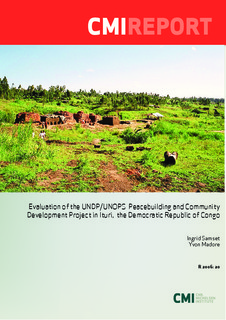| dc.description.abstract | Building peace through community development: this was the key idea of the evaluated project, which was run in the war-torn Ituri district of the DRC from 2003 onwards. The planning of the project did not take sufficiently into account the difficult conditions under which it would be run. Centralisation of project management tasks to UNDP and UNOPS in Kinshasa, and the shortage of resources that were made available for the project at this central level, complicated implementation efforts on the ground. Strategic management was also weak. Still, many positive results materialised as the local partner organisations welcomed the idea of building peace through community development and acted on it in their micro projects. Thanks to many skilful local partners and a dedicated
UN project team in Ituri, and despite considerable delays, the micro projects came a long way towards reaching the aims of reconciliation, reconstruction, local capacity building, and HIV/AIDS awareness raising. As a whole the project contributed to launching the processes of peacebuilding and community development in the district. But given the uniqueness of the project and its weak coordination with other agencies, little ground was prepared for a scale-up and a transfer of results in a subsequent phase.
The peacebuilding and community development project was hence a success – but a success that materialised in spite of an unsuitable organisational framework, weak strategic management, insufficient coordination, and continued violence in Ituri. It was in other words a “success by default”; one that came about despite choices made within the project that were not the most amenable to goal attainment. Yet given the project’s positive results, its still unrealised potential, the need for such a project in Ituri, and the learning of lessons within UNDP; the report recommends that the project continue and proposes a number of reforms that should be made within it in a new phase. | |
